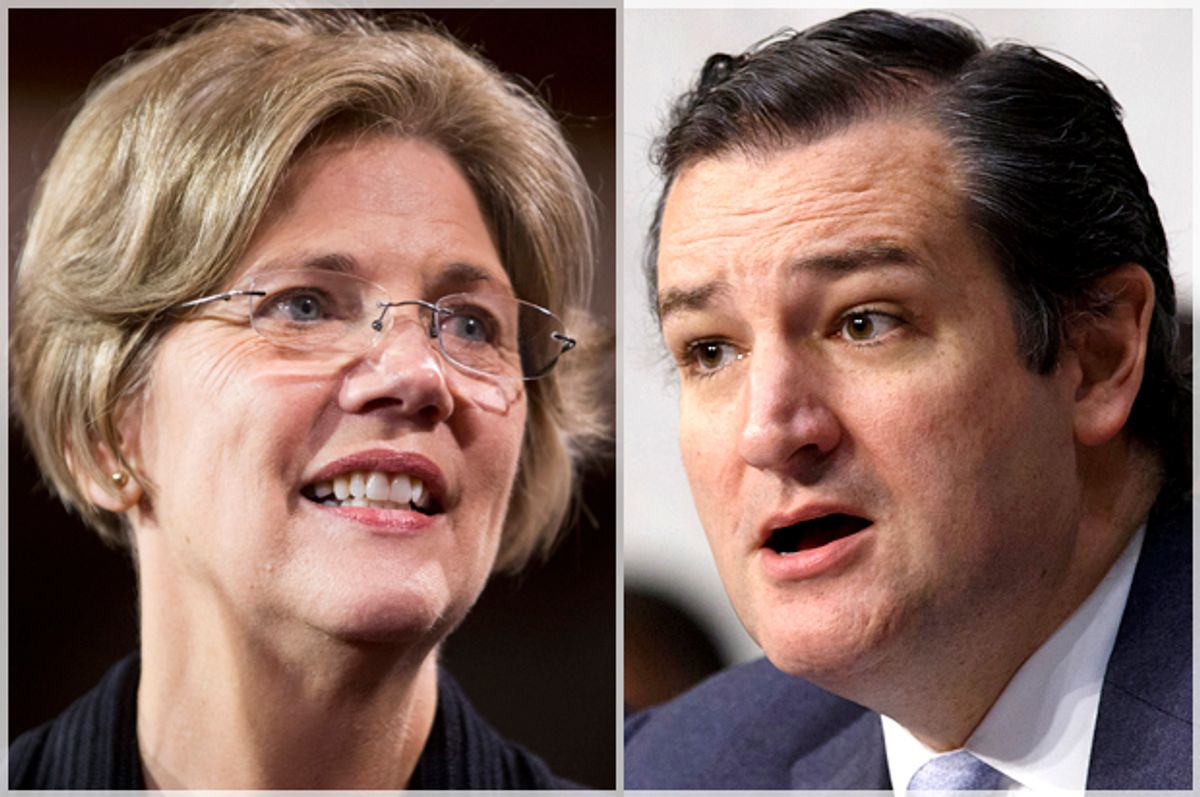In the wake of President Obama’s reelection in 2012, reporters found one source of solace for the GOP. “One race the Republicans appear to be winning is the one for the deepest bench of rising stars,” wrote the Washington Post, and plenty of folks followed up. Democrats, meanwhile, had nobody on the bench but Hillary Clinton – a formidable candidate if she were to run, but that wasn’t even certain.
Beyond Clinton, there seemed to be a wasteland populated by ambitious governors no one had ever heard of (Martin O’Malley), and some who were well known but not widely liked (Andrew Cuomo). Oh, and Brian Schweitzer.
The Republican list, meanwhile, seemed almost infinite: blue and purple state governors like New Jersey’s Chris Christie, Wisconsin’s Scott Walker, Ohio’s John Kasich and Virginia’s Bob McConnell, and Tea Party senators like Rand Paul, Ted Cruz and Marco Rubio. Romney’s ambitious, “wonky” running mate, Rep. Paul Ryan, had his fans, as did former Florida Gov. Jeb Bush. Even Texas Gov. Rick Perry, recovered from back surgery and sporting hot new glasses, could have another life in 2016.
But in two years, the situation has almost reversed itself. Promising GOP governors – McDonnell, Christie, Walker – find themselves dogged by scandal. The Tea Party trio of Paul, Cruz and Rubio still vies for media attention and right wing adoration, but Rubio’s immigration reform work doomed him on the right. Unbelievably, Paul is widely labeled the frontrunner (but don’t tell that to Cruz), while the party establishment and neocon hawks search for an alternative. Despite all that impressive talent, Mitt Romney leads the pack in New Hampshire.
Meanwhile, in what’s widely being reported as trouble for Hillary Clinton, because that’s the narrative the media know best, it turns out there are a bunch of popular and maybe even formidable Democrats. Vice President Joe Biden and Sen. Elizabeth Warren wowed the crowd at Netroots Nation. (Check out this great New Yorker Biden profile if you want to know how the VP is keeping his options open). The Netroots buzz inspired the Washington Post’s Phillip Rucker and Robert Costa to survey the landscape of Democrats who’ve put a toe or more in the water for 2016.
We learned that Minnesota Sen. Amy Klobuchar is visiting Iowa (it is only one state away), while New York Sen. Kirsten Gillibrand has a book coming out. Missouri Gov. Jay Nixon is said to be huddling with donors, believing the party could use a dose of red state common sense.
This is all framed as mildly ominous news for Hillary Clinton – the headline is “With liberals pining for a Clinton challenger, ambitious Democrats get in position” -- but Klobuchar, Gillibrand and Nixon have all endorsed Clinton, and Warren has encouraged Clinton to run while insisting she won’t do so herself. The only Democrats listed who may still run even if Clinton does too are O’Malley and Vermont’s Bernie Sanders.
Regardless of the intent of the framing, the Rucker-Costa story actually pointed out the vitality in the Democratic Party, where lively debates over income inequality and foreign policy have fallen short of creating bitter divisions and factions, at least so far. Again, contrast that with the GOP, where Ted Cruz seems to be staking his 2016 hopes on his ability to humiliate every party leader and make sure Republicans will never make inroads with the Latino population. He's blocking bipartisan emergency legislation to deal with the border crisis, and pushing to reverse President Obama’s deferred action on deportation for young people brought here by their parents.
Meanwhile Warren, the progressive elected the same time as Cruz, is touring the country campaigning for Democratic Senate candidates, even some who are more centrist than she is, like Kentucky’s Alison Lundergan Grimes and West Virginia’s Natalie Tennant. She’s focused on growing the Democratic Party, not cutting down colleagues who are less progressive.
So: The GOP’s right wing firebrand is a loose cannon who is completely out for himself, while the Democrats’ left wing firebrand is working amiably with party leaders and deflecting talk of a primary challenge to Clinton. In the end, the rising number of possible alternatives to Hillary Clinton is a sign of Democratic strength, even if the media tends to bill it as weakness.



Shares